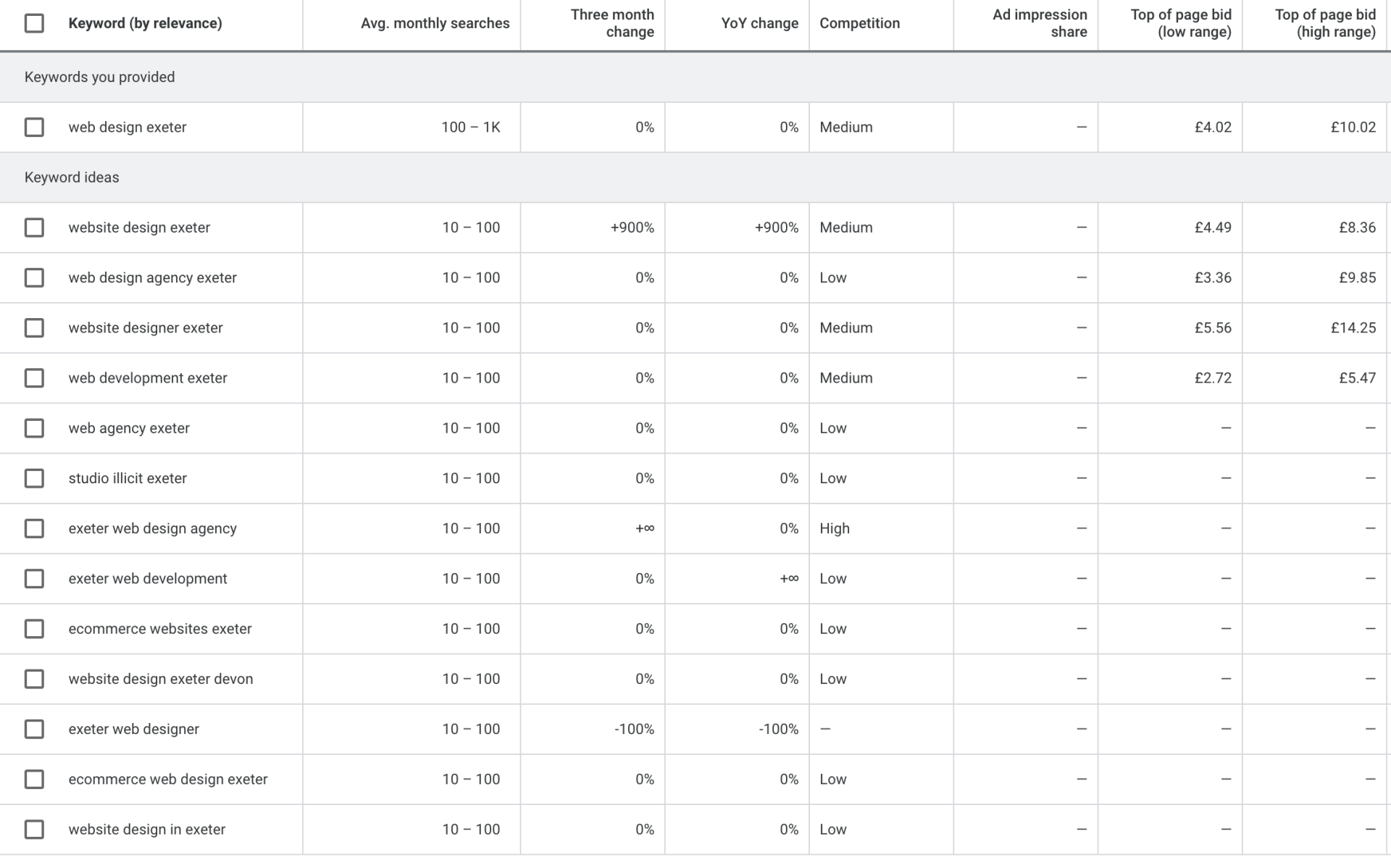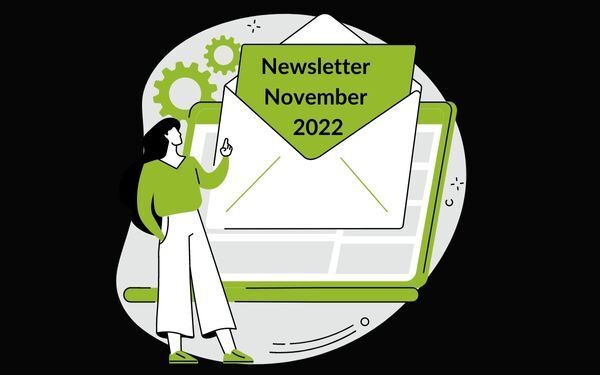SEO Keyword research & keyword planning tools
Keyword research strategies to get ahead with SEO

A strong SEO keyword research process can lay the foundations for an effective digital marketing strategy that will see your business rise in search listings and increase sales. Appearing on the first page of Google, Bing and other search engines will make a huge difference to your business and keyword research is the first step in this. In this blog post, we highlight keyword types, the link between buyer intent and keyword choice, how to do keyword research (including great tools you can use) and outline some common SEO keyword research mistakes.
Keyword types and why they matter
Keywords are the words and phrases that people type into a search engine (e.g. Google) to find your business. They describe your products and may also include additional details like your location. Keywords tell search engines what your content is about and helps them to return the most relevant results to customers. Well-optimised content that is high quality and tailored to search phrases stands a greater chance of being discovered and ranking well.
Short tail or head term keywords are one or two words long and usually generic or descriptive, for example, ‘bakery’ or ‘web design’. They generally have high search volumes and are very competitive to rank well for. Long tail keywords are phrases of three words or more, e.g. ‘vegan bakery in London’ or ‘web design for retail businesses’. As they are more specific, they are generally easier to rank for, with less or more localised competition. However, they will be searched for less frequently as a result.
Keywords, intent and the customer journey
A critical question with keywords is who are you hoping to attract to your website? For most businesses, the answer will be those ready to purchase. In this case, your keywords will need to target customers with buying intent, (those further down the buyer journey). SEO software providers Moz use the example of a search query for shoes. A person searching for ‘shoes’ is likely just browsing, with low intent to purchase. Whereas someone querying ‘best price men’s black trainers size 11’, appears to be ready to buy. Long-tail keywords are therefore often better for achieving a conversion.
How to do SEO keyword research in six simple steps
1. Create an initial list of words and phrases your customers use
At the simplest level, you can start keyword research by simply thinking about the words that your ideal customers would use to find your business or products. For example, a garden centre may write down phrases like ‘garden centre’, ‘nursery’, ‘plants’ and ‘plant experts’, as well as more specialised or location-based phrases like ‘garden centre in Devon’ and ‘where to buy fruit trees in Devon’.
To help understand your customers’ behaviours it’s a good idea to create personas. We’ve created some buyer persona templates to help you with this.
Download FREE buyer persona templates

2. Use a search engine
Another option is to have a go at searching for keywords you think might be relevant in Google. Try using a private or incognito browser so that your past search history doesn’t influence results. Look at the returned results: how many results are there and what articles or pages rank highly? Also, look at the related search results at the bottom of the page. Here you’ll find similar phrases that people have searched for, which you can also add to your list of potential keywords. You can also explore these related search results to find even more keyword phrase ideas.
3. Use Google’s Keyword Planner
One of the most commonly used tools for SEO keyword research is Google’s Keyword Planner. After all, with nearly 93% of the search engine market share in the UK, it’s likely that your customers will use Google. So, their in-house planner is a great tool to use.
Google’s Keyword Planner allows you to look at the search volume of keywords related to your business. The level of competition for a keyword and its relative price if you were to use them in an ad is a good measure of the relative demand for different keywords. It can therefore help you to identify which keywords you should target relative to your competitors.
Google Keyword Planner – a worked example
If we enter the long-tail keywords ‘web design Exeter’ into Keyword Planner we are shown how often the term is searched for each month, the 3-month and annual change on this, the level of competition and how much businesses are bidding for these terms in PPC ad campaigns.

The keyword planner then suggests keywords based on your query and displays the same information for each. The above screenshot shows that the top keywords are receiving 10-100 searches a month and that competition for most terms is medium or low. We can see that ‘Exeter web design agency’ is the only term with high competition and there are four terms with medium competition. We can also see that competitors are placing the most value in the top five results (where bids are being placed for ads). More expensive keywords probably offer the best return on investment in terms of the strongest leads but will be harder to rank for organically and cost more in paid ad bids.
From the keyword planner results, you have a list of keywords to target and a relative impression of their competition and popularity.
4. Other keyword research tools
There is a wealth of keyword research tools available and each will offer a range of features. We’ve compiled a list of 15 SEO tools for businesses, however, here are a few of our favourites.
SE Ranking
SE Ranking is a comprehensive SEO tool, enabling you to:
• complete an SEO audit of your website;
• track keywords across search engines and in different countries, regions and cities;
• check websites for backlinks
• analyse competitors; and much more.
It’s a paid tool but offers a lot of advanced functionality with an easy-to-use interface.
Visit SE Ranking
Google Trends
If you want to see how search behaviour for keywords changes over time then Google Trends is a great tool. You can see the relative popularity of a keyword at any point from 2004-present. You can specify geographies and also compare terms side-by-side. If you want to rank for emerging and trending keywords it’s a really valuable tool.
Visit Google Trends
Answer the Public
Answer the Public tells you all the common searches made relating to your keyword. For instance, entering the keywords ‘web design’ returns questions like…
• ‘What website design software is the best?
• ‘Are web design and web development the same?’; and
• ‘Why web design is important?’
This insight into the searches users make can help to identify which long-tail keywords you should use. You can see results by country and results are displayed in a helpful visual format like a brainstorm or spider-diagram. There are free and paid options for use.
Visit Answer the Public
Ubersuggest
Ubersuggest can be used on a keyword basis, but also for reviewing competitor websites by entering in a website URL. You’ll be shown…
• how many backlinks your competitors have;
• organic monthly traffic;
• domain authority,
• your competitors’ top pages; and
• the SEO keywords your competitors rank for.
This can be really useful for identifying which keywords to target. There are free and paid options for use.
Visit
Ubersuggest

5. Refine your lists and strategise!
Steps 1-4 above, will have given you lots of inspiration for keywords and you probably have a long list by now. Using what you’ve learned, including assessments of competitiveness and popularity from tools like Google Keyword Planner, you should now decide which keywords to target in your strategy.
You’ll want to create a shorter, more targeted master list of keywords and keyword phrases. You should use both short and long-tail keywords and find a middle ground where you can compete. Your goal is to find this sweet spot of keywords that get a lot of searches but are also highly relevant to your business and website and aren’t excessively dominated by competitors.
Your keywords should become a core part of your ongoing marketing strategy and your content creation plans should focus on utilising your keywords in your blogs and site content.
6. Review your keywords regularly
SEO keyword research isn’t a one-time activity. Keywords should be regularly reviewed and will change as trends in your industry alter, new products are developed and customer demand evolves. It’s also important to think about what success looks like in the context of SEO. Over time you want to see that your keywords lead to conversions in the form of metrics like sales, mailing list sign-ups, social media engagement and downloads. Tracking your keyword conversions means that you can refine content over time to focus on your most successful keywords.
Common mistakes in SEO keyword research
If you’re new to keyword research it can feel like a bit of a minefield. However, if you can avoid making these common mistakes, you’ll be off to a good start.
1. Using different keywords to your customers. Try not to use too many technical or industry terms in your keywords. Your customers probably won’t know them and therefore won’t be searching for them.
2. Targeting keywords that are too popular / competitive. It’s almost impossible for a smaller business to rank for a popular short-tail keyword in isolation. Terms like ‘lawyer’, ‘watches’, ‘mobile phones’, ‘DIY’ and ‘children’s clothing’ are always going to be dominated by major international brands. To rank, you’ll need to use variants or extend the keyword to a long-tail keyword by combining it with local terms e.g. ‘Exeter DIY shop’ or ‘devon watchmakers’
3. Pursuing keywords that no one is searching for. Your keyword research may identify some niche long-tail keywords with low competition. But if no one is searching for them, you’re wasting time trying to rank for them.
4. Getting impatient when you don’t see results. Keyword research isn’t an exact science. It can also take time for positive results to show, even if your strategy is sound. Whilst you may see results in 3-6 months, organic SEO improvements from adding keywords to your website can take as much as 6-12 months to impact search listings. You should see this keyword research as an evolving piece of work that requires experimentation and refinement over time.

Using keywords in your website content & keyword density
Once you have your list of keywords, you should review your website content and ensure your keywords feature in your website copy. Use them both in your body text and also in your page titles, headings and sub headings.
It’s important to be aware of keyword density. Yoast recommends an optimal keyword density range of 0.5 – 3%. If you aim for the middle ground of 1-2%, in an 800-word content block you would use your keywords 8 – 16 times. Much more than this, and you risk keyword stuffing which reads poorly to website visitors and can lead to penalties from search engines. See our blog post on Google’s Helpful Content Update which makes it clear that keyword stuffing will affect site rankings for more detail.
You should aim to align your keyword usage with the stages of the buyer journey. Feature keyword phrases with commercial intent, e.g. ‘buy garden furniture’, on your sales or landing pages. Feature informative or research-focused keywords in your blog content. As an example, ‘how to start a vegetable garden at home’ or ‘affordable garden renovation projects’ would make for great content for a garden centre’s blog.
Where else should you use your keywords?
Finally, it’s important to remember that time invested in keyword research will provide wider benefits to your business. Besides your written website content, (pages, product pages and blog posts) there are several places where you should use your keywords.
1. Your website’s metadata – page descriptions, URLs and alt-tags.
2. Social media – consider which of your keywords could be used as hashtags.
3. Email marketing – your keywords can be used in your email subject lines.
4. PPC Ads – your keyword lists can help you to identify terms to target in pay-per-click ads.
Help with keyword research and SEO in Exeter
If you need help with keyword research or any other aspect of SEO then QuayClick can help. We're an Exeter web design and digital marketing agency. Our team is experienced at identifying relevant keywords for your business and advising on a keyword strategy that will help set your business apart online. If you’d like to find out more about our SEO services please contact us in Exeter today.




QUICK LINKS
QC Newsletter sign-up
We will get back to you as soon as possible.
Please try again later.
All Rights Reserved | QuayClick Marketing Ltd
We’re a website design and digital marketing agency based in Exeter. We help businesses grow online and have over 20 years of experience in Web Design. We offer several inbound strategies, including paid search and SEO. In addition, our content team can help with copywriting and email campaigns.








